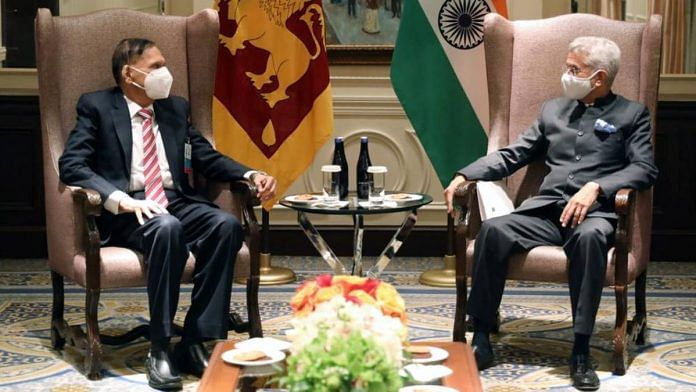
New Delhi: New Delhi has asked Colombo to ensure “equality, justice, peace, and respect for the Tamil people within a united Sri Lanka” by implementing the long-pending 13th Amendment to the Sri Lankan Constitution.
This would best serve Sri Lanka’s own interests, and “devolution is an important part of this process,” External Affairs Minister S. Jaishankar told his Sri Lankan counterpart, G.L. Peiris, who was on a two-day visit here. Jaishankar recalled the positive impact of India’s developmental and rehabilitation support for Sri Lanka, according to a statement issued by the Ministry of External Affairs (MEA).
This comes weeks after Sri Lanka’s Tamil legislators wrote to Prime Minister Narendra Modi seeking New Delhi’s intervention to push the Rajapaksa government to find a lasting solution to the problem of implementing all the provisions laid out in the 13th Amendment, also known as 13A — an issue that continues to strain bilateral ties between India and Sri Lanka.
The 13th Amendment became part of the 1978 Constitution of Sri Lanka as a direct result of Indian intervention in 1987, under the India-Sri Lanka Peace Accord. The amendment led to the creation of Provincial Councils.
Under this, the Sri Lankan government had committed to a power-sharing arrangement to enable all nine provinces in the country, including Sinhala-majority areas, the right to self-govern. However, successive governments in Colombo have not fully implemented the amendment, despite New Delhi’s repeated urging.
Also Read: India, Sri Lanka ties complicated from Ramayana times but our tensions are low: Envoy Moragoda
Safe maritime domain, line of credit
During foreign minister Peiris’s visit — he left for Colombo Tuesday after meetings with National Security Advisor Ajit Doval and Foreign Secretary Harsh Vardhan Shringla — it was also decided that New Delhi and Colombo would work together to keep their shared maritime domain in the Indian Ocean safe.
In this aspect, India and Sri Lanka have also decided to boost their air and sea connectivity to enable greater investment flows, a secure energy partnership and greater people-to-people linkages under the larger framework of India’s Security and Growth for All in the Region (SAGAR) and ‘Neighbourhood First’ policies.
Bilateral ties had hit rough waters last year when the Rajapaksa regime cancelled the $500-million East Container Terminal project — a tripartite agreement among Sri Lanka, India, and Japan — in February 2021 and instead handed over the West Container Terminal (WCT) development plan to the Adani Group, seeking private investment.
The matter was apparently resolved after Foreign Secretary Shringla visited Colombo in October 2021.
India last week extended a $500-million line of credit to Sri Lanka to enable it to purchase petroleum products, as the country continues to face a severe foreign exchange and energy crisis.
“The Sri Lankan Foreign Minister expressed gratitude for India’s recent assistance and updated EAM on the steps taken by the Government of Sri Lanka on human rights and reconciliation,” the MEA said.
The line of credit was announced more than two weeks after a virtual meeting between Jaishankar and Sri Lanka’s finance minister, Basil Rajapaksa, on 15 January.
Last month, the island nation signed a deal with the Sri Lankan chapter of the Indian Oil Corporation (LIOC), Ceylon Petroleum Corporation (CPC), and the Joint Venture between LIOC and CPC, to redevelop around 75 oil tanks in Trincomalee.
Joint Working Group on Fisheries
During the visit, the two sides reiterated a longstanding consensus to handle the issue of fishermen allegedly crossing the International Maritime Boundary Line (IMBL) through a “humanitarian approach” and to “refrain from the use of violence in dealing with incidents”.
“They agreed that bilateral mechanisms should meet early, starting with the Joint Working Group on Fisheries,” the MEA said.
While these discussions were going on in Delhi, the Sri Lankan Navy arrested 11 Indian fishermen and seized three fishing trawlers for allegedly poaching in the island nation’s waters.
“Exchanged views on the fishermen issue and agreed that bilateral mechanisms should meet early,” Jaishankar said in a tweet Monday after his meeting with Peiris.
Also read: China says ‘firmly’ backing Sri Lanka in defending its sovereignty, offers to upgrade BRI projects

COMMENTS